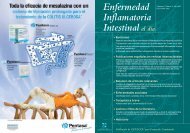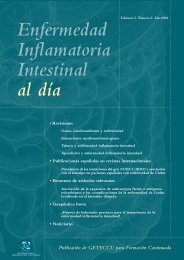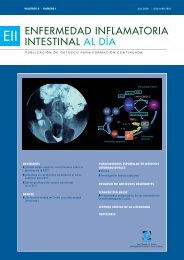Número 1 - EII al dÃa
Número 1 - EII al dÃa
Número 1 - EII al dÃa
Create successful ePaper yourself
Turn your PDF publications into a flip-book with our unique Google optimized e-Paper software.
PUBLICACIONES ESPAÑOLAS<br />
EN REVISTAS INTERNACIONALES<br />
F. Gomollón<br />
Hospit<strong>al</strong> Clínico Universitario. Zaragoza<br />
Dyspepsia and irritable bowel syndrome after a S<strong>al</strong>monella<br />
gastroenteritis outbreak: one-year follow-up cohort study<br />
Dispepsia y síndrome de intestino irritable después de un brote de<br />
gastroenteritis por S<strong>al</strong>monella: estudio de cohortes con un año de seguimiento<br />
Mearin F, Pérez-Oliveras M, Perelló A, Vinyet J, Ibáñez A, Coderch J, Perona M.<br />
Gastroenterology 2005;129:98-104.<br />
Centro médico Teknon. Barcelona, ABS Torroella de Montgrí. Serveis de S<strong>al</strong>ut Integrats Baix Empordá. Torroella<br />
de Montgrí y Direcció dÀv<strong>al</strong>uació, Informació i Recerca. Serveis de S<strong>al</strong>ut Integrats Baix Empordá.<br />
Resumen<br />
Tras una epidemia de gastroenteritis causada por S<strong>al</strong>monella los autores identifican a 677 afectados y 1.201 controles<br />
ajustados por lugar de residencia, sexo y edad; y ev<strong>al</strong>úan mediante cuestionarios la frecuencia de dispepsia<br />
y/o Síndrome de Intestino Irritable (SII) en un seguimiento de un año (con cuestionarios a los 3, 6 y 12 meses). En<br />
el punto de análisis (12 meses) se dispone de 271 cuestionarios de afectados y 335 controles. Los criterios de diagnóstico<br />
son los ROMA II. Antes del brote de gastroenteritis, en ambos grupos, se observaba una prev<strong>al</strong>encia similar<br />
tanto de dispepsia funcion<strong>al</strong> como de síndrome de intestino. Aunque no se encontraron factores predictivos de SII,<br />
sí que se observaba que la dispepsia se desarrollaba significativamente más en aquellos pacientes con dolor prolongado<br />
y vómitos durante la gastroenteritis. Al año de seguimiento 1 de cada 7 pacientes había desarrollado dispepsia<br />
y 1 de cada 10 SII. En los controles la incidencia de dispepsia y/o SII se mantuvo estable a lo largo de todo<br />
el año de seguimiento.<br />
Summary<br />
After an outbreak of gastroenteritis caused by S<strong>al</strong>monella, the authors identify 677 cases and 1201 controls matched by<br />
place of residence, gender and age; and use questionnaires to ev<strong>al</strong>uate frequency of dyspepsia and/or irritable bowel<br />
syndrome (IBS) during a one year follow-up program (with questionnares after 3, 6 and 12 months). On the point of<br />
an<strong>al</strong>ysis (12 months), questionnares from 271 cases and 335 controls had been collected. The diagnosis criteria were<br />
ROMA II. Prior to the gastroenteritis outbreak, both arms showed similar prev<strong>al</strong>ence of function<strong>al</strong> dyspepsia and irritable<br />
bowel syndrome. Although no IBS predictive factors were found, dyspepsia was observed to appear significantly more<br />
often in those patients who had prolongued pain and vomiting over the gastroenteritis episode. After one year followup,<br />
dyspepsia and IBS were present in 1 out of 7 and 1 out of 10 patients respectively. In the control arm, incidence of<br />
dyspepsia and/or IBS remained stable throughout the 1 year follow-up.<br />
P<strong>al</strong>abras clave: Gastroenteritis, S<strong>al</strong>monella, dispepsia, Síndrome de Intestino Irritable (SII)<br />
Keywords: Gastroenteritis, S<strong>al</strong>monella, dyspepsia, Irritable Bowel Syndrome (IBS)<br />
Comentario: nuestra revista se titula “Enfermedad<br />
Inflamatoria Intestin<strong>al</strong> <strong>al</strong> Día”. ¿Por qué comentar<br />
este artículo? ¿No tenemos bastantes pacientes, y<br />
bastantes temas a tratar con las enfermedades inflamatorias?<br />
¿Queremos en Geteccu absorber <strong>al</strong> grupo<br />
de trastornos funcion<strong>al</strong>es de la AEG? Evidentemente,<br />
no. Son otras dos las razones: el artículo es excelente<br />
(y provocador) y cada vez hay más evidencia del papel<br />
de la inflamación en los trastornos funcion<strong>al</strong>es digestivos,<br />
o <strong>al</strong> menos <strong>al</strong>gún subgrupo de ellos. No vamos<br />
a hacer una revisión exhaustiva, basta con citar un<br />
artículo recientísimo (Clin Gastroenterol Hepatol<br />
2005;3:980-986) donde los autores encuentran evidencia<br />
de <strong>al</strong>teraciones inflamatorias no sólo en la<br />
mucosa intestin<strong>al</strong> sino también en el sistema inmunológico<br />
sistémico (ver el artículo y sus referencias).<br />
24 • Enfermedad Inflamatoria Intestin<strong>al</strong> <strong>al</strong> día - Vol. 5 - Nº. 1 - 2006











